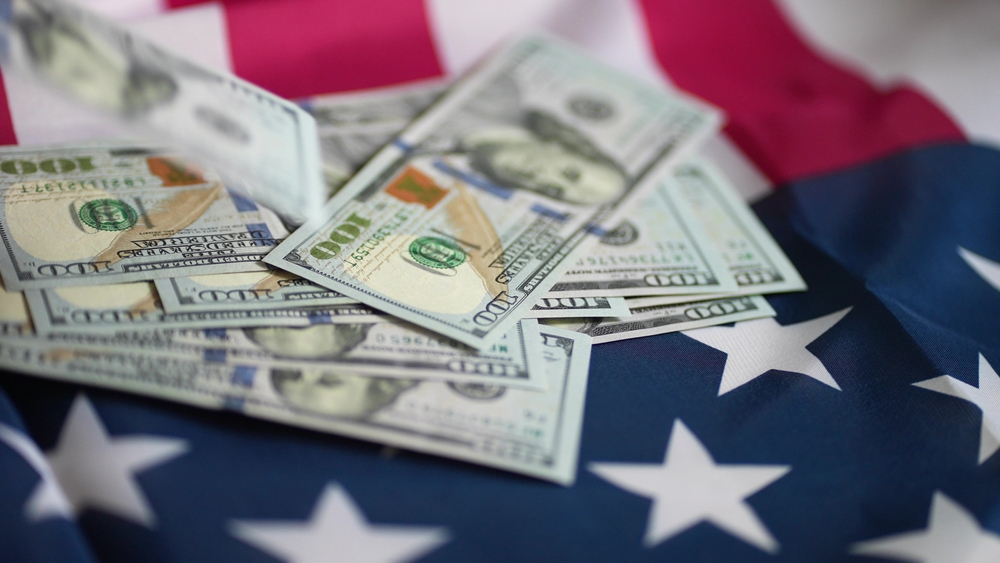Financial markets worldwide have been rocked by Donald Trump’s erratic shifts on tariffs with investors globally struggling to assess the impact of the US President’s trade war on equities and bonds.
Worrying signs that a crisis was brewing in the US government bond market were a key factor in forcing Trump to call a delay on 9 April to his so-called “reciprocal” tariffs on most US trading partners with the exception of China.
Volatility in the US Treasury market has risen markedly, hitting an 18-month-high during April, according to the MOVE index – the ICE BofAML US Bond Market Option Volatility Estimate Index.
The IMF has warned that Trump’s trade war was increasing the risk of a US recession this year and that tariffs would lead to a significant slowdown in global economic growth in 2025.
Confidence has been further weakened by Trump’s repeated threats to fire Jerome Powell as Chair of the Federal Reserve, a move that would wreck international investors' confidence in the US central bank’s capacity to set monetary policy independently from political interference by the White House.
Trump has blasted Powell with crude insults such as “Mr Too Late” and a “major loser” for not cutting US interest rates, comments that have only inflamed fears that the President could yet spark a damaging financial crisis.
“The fact that Trump is publicly criticising Powell means that the Fed’s thought process is no longer ‘untainted’. That Rubicon has already been crossed so it is now a matter of how much damage has been, and will be done,” said Chris Darbyshire, CIO at The Private Investment Office, a UK wealth manager.
Some categories of international investors would be keen to reduce their exposure to the US Treasury market because they would judge Trump’s tactics and policies as “too hot to handle,” said Darbyshire.
Sharp falls in US equities and the dollar in response to Trump’s threats have forced the president to concede that he has “no intention” of dismissing Powell whose position as Fed chair is due to end in May 2026.
The dollar and US Treasury bonds have both weakened since 2 April when Trump first announced reciprocal tariffs. This unusual double drop represents a watershed moment, according to Pictet Asset Management.
“Trump has given bond investors every incentive to consider alternatives to Treasuries and the dollar. Whatever the eventual outcome of the trade negotiations taking place, we think the damage to the [American] economy and US assets has already been done. There is no going back from here,” said Pictet.
Adding to worries about the outlook for the Treasury market is Trump’s determination to implement large tax cuts at a time when the US annual fiscal deficit has already reached $1.8trn. Budget proposals tabled by Republican senators would result in the government’s annual deficit rising to $3.5trn by 2034, the equivalent of 8.2% of GDP, according to the Committee for a Responsible Federal Budget, a nonpartisan watchdog.
“These deficit levels would be unprecedented during normal economic circumstances and present major risks to the country's economy and ability to respond to crises,” said the CRFB.
Concerns about the prospect of persistent large US budget deficits over the next decade saw the BlackRock Investment Institute this month reiterated its “underweight” recommendation on long-term US Treasuries, describing this as its “highest conviction” view.
Foreign holdings of US Treasuries stood at a record $8.82trn in February. The two largest owners, Japan and China, own Treasury bonds worth $1.12trn and $784.3bn, respectively, according to the monthly Treasury International Capital System report.
The nightmare scenario that makes analysts shudder is the possibility that Trump’s trade war could encourage foreign governments to punish the US for imposing tariffs on their exports by dumping Treasuries and driving up US borrowing costs.
“Concerns have mounted about the US debt level and the ability to finance that debt in the middle of a trade conflict. Would other countries attempt to use the US’s debt vulnerability as a weapon in the tariff fight? Thus far, that does not appear to be the case,” said Brian Levitt, global market strategist at Invesco.
US Treasury secretary Scott Bessent has insisted that no evidence exists of significant selling of US Treasuries by foreign governments.
However, Japanese institutional investors including banks and pension funds, sold off more than $20bn in international bonds in the two weeks ending April 11, according to preliminary data from Japan’s Ministry of Finance. The MoF does not publish a geographic breakdown but US Treasuries and US government guaranteed mortgage-backed securities were very likely account for a significant share of the sales, one of the largest two-week outflows since records began in 2005.
The 50 largest US bond ETFs listed in Europe have registered mixed flows after 'liberation day' on 2 April, with 21 attracting inflows between by 22 April while 29 have seen withdrawals over the same period, according to data from ETFbook. The Amundi US Curve Steepening 2-10 UCITS ETF (STPU) has more than doubled in size after gathering inflows of $348m while The Amundi US Treasury Bond 7-10Y UCITS ETF (US71) has pulled in $338m.
Blackrock's iShares US Aggregate Bond UCITS ETF (SUAG) has recorded withdrawals of $345m but much of that appears to have been reallocated into shorter maturity products such as BlackRock's iShares $ Treasury Bond 1-3yr UCITS ETF (IBTS), which has attracted inflows of $308m since 2 April.
Whether Beijing might decide to weaponise its Treasury holdings in response to Trump’s tariffs is a hot topic of debate among Wall Street analysts.
Bessent has described a US trade war with China as “unsustainable”, raising hopes of a deal between the two countries at some point. However, diplomatic negotiations between Washington and Beijing about ending the trade war have not begun so far.
Trade tensions between Washington and Beijing could rise further and an economic détente between might not arrive until the latter part of Trump’s presidential term, cautioned Stephen Jen, the veteran strategist at Eurizon SLJ Asset Management.
“Both the US and China are no longer interested in win-win arrangements or even zero-sum deals. It is about making the adversary lose more. This is a ‘war’ mentality,” said Jen.












